MGT501 Assignment: Cross-Cultural Management at Dorendo, France
VerifiedAdded on 2022/10/11
|13
|3529
|18
Report
AI Summary
This report analyzes the cross-cultural management challenges faced by Jianguo in Dorendo's French operation, stemming from cultural misunderstandings between French and Chinese counterparts. The report identifies conflicts based on Hofstede's cultural dimensions, including power distance, individualism/collectivism, and uncertainty avoidance. It explores reasons such as lack of cross-cultural training, ineffective leadership, and market preference differences. The report recommends strategies for Jianguo, such as cross-cultural training, enhanced knowledge of global business trends, and the development of active listening skills. Furthermore, the report highlights the competencies required for 21st-century managers, emphasizing the need for adaptability and cultural sensitivity to navigate global business environments effectively.
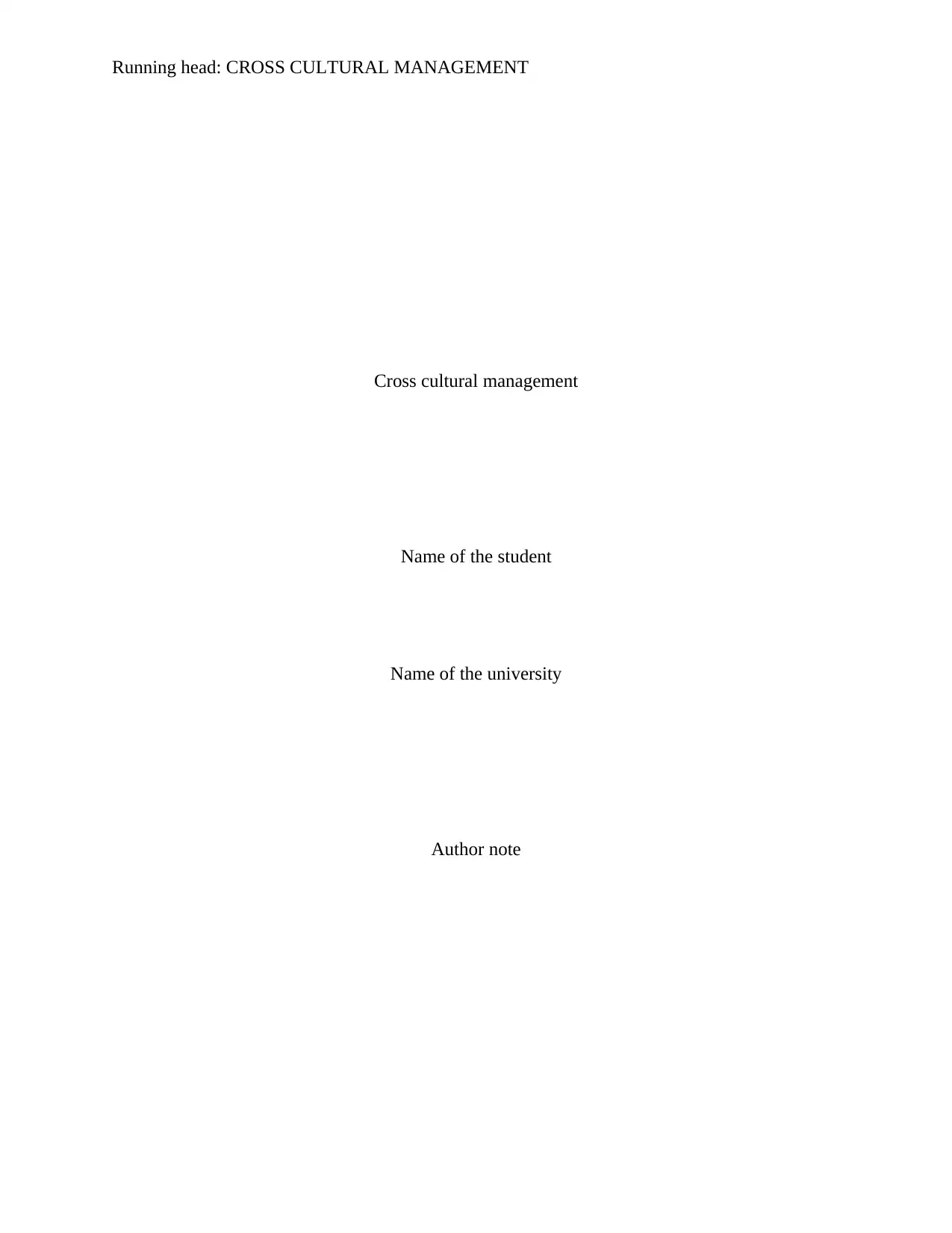
Running head: CROSS CULTURAL MANAGEMENT
Cross cultural management
Name of the student
Name of the university
Author note
Cross cultural management
Name of the student
Name of the university
Author note
Paraphrase This Document
Need a fresh take? Get an instant paraphrase of this document with our AI Paraphraser
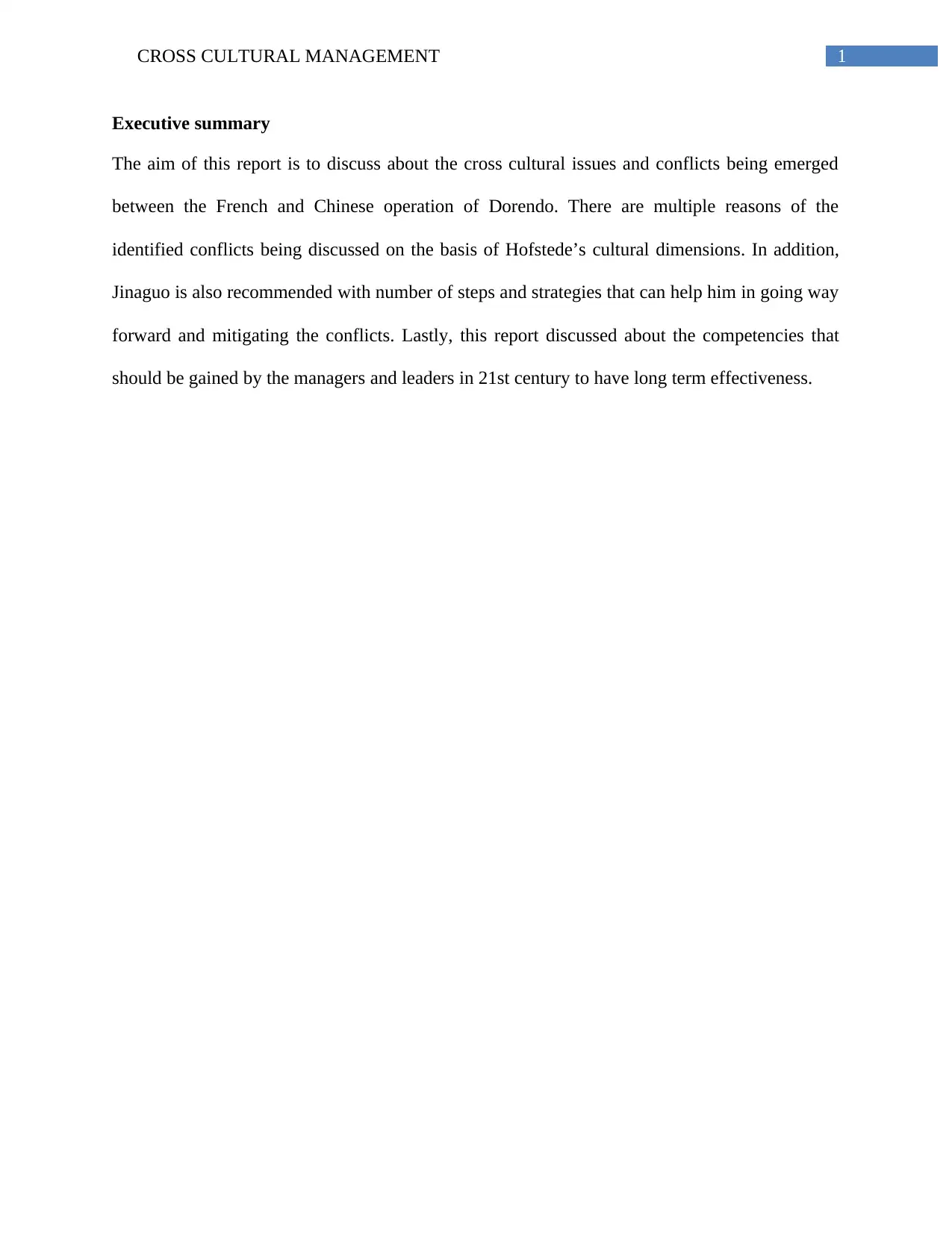
1CROSS CULTURAL MANAGEMENT
Executive summary
The aim of this report is to discuss about the cross cultural issues and conflicts being emerged
between the French and Chinese operation of Dorendo. There are multiple reasons of the
identified conflicts being discussed on the basis of Hofstede’s cultural dimensions. In addition,
Jinaguo is also recommended with number of steps and strategies that can help him in going way
forward and mitigating the conflicts. Lastly, this report discussed about the competencies that
should be gained by the managers and leaders in 21st century to have long term effectiveness.
Executive summary
The aim of this report is to discuss about the cross cultural issues and conflicts being emerged
between the French and Chinese operation of Dorendo. There are multiple reasons of the
identified conflicts being discussed on the basis of Hofstede’s cultural dimensions. In addition,
Jinaguo is also recommended with number of steps and strategies that can help him in going way
forward and mitigating the conflicts. Lastly, this report discussed about the competencies that
should be gained by the managers and leaders in 21st century to have long term effectiveness.
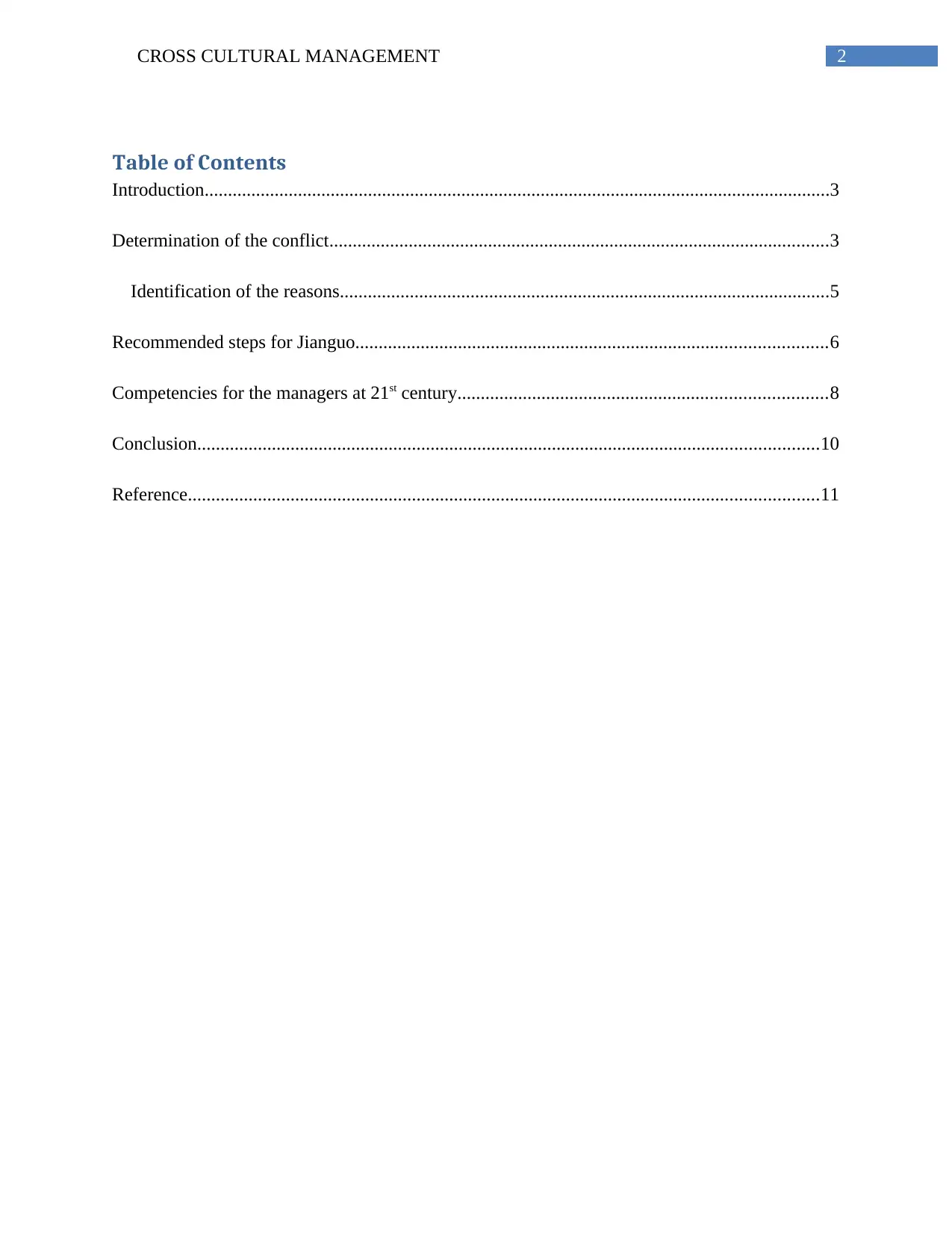
2CROSS CULTURAL MANAGEMENT
Table of Contents
Introduction......................................................................................................................................3
Determination of the conflict...........................................................................................................3
Identification of the reasons.........................................................................................................5
Recommended steps for Jianguo.....................................................................................................6
Competencies for the managers at 21st century...............................................................................8
Conclusion.....................................................................................................................................10
Reference.......................................................................................................................................11
Table of Contents
Introduction......................................................................................................................................3
Determination of the conflict...........................................................................................................3
Identification of the reasons.........................................................................................................5
Recommended steps for Jianguo.....................................................................................................6
Competencies for the managers at 21st century...............................................................................8
Conclusion.....................................................................................................................................10
Reference.......................................................................................................................................11
⊘ This is a preview!⊘
Do you want full access?
Subscribe today to unlock all pages.

Trusted by 1+ million students worldwide
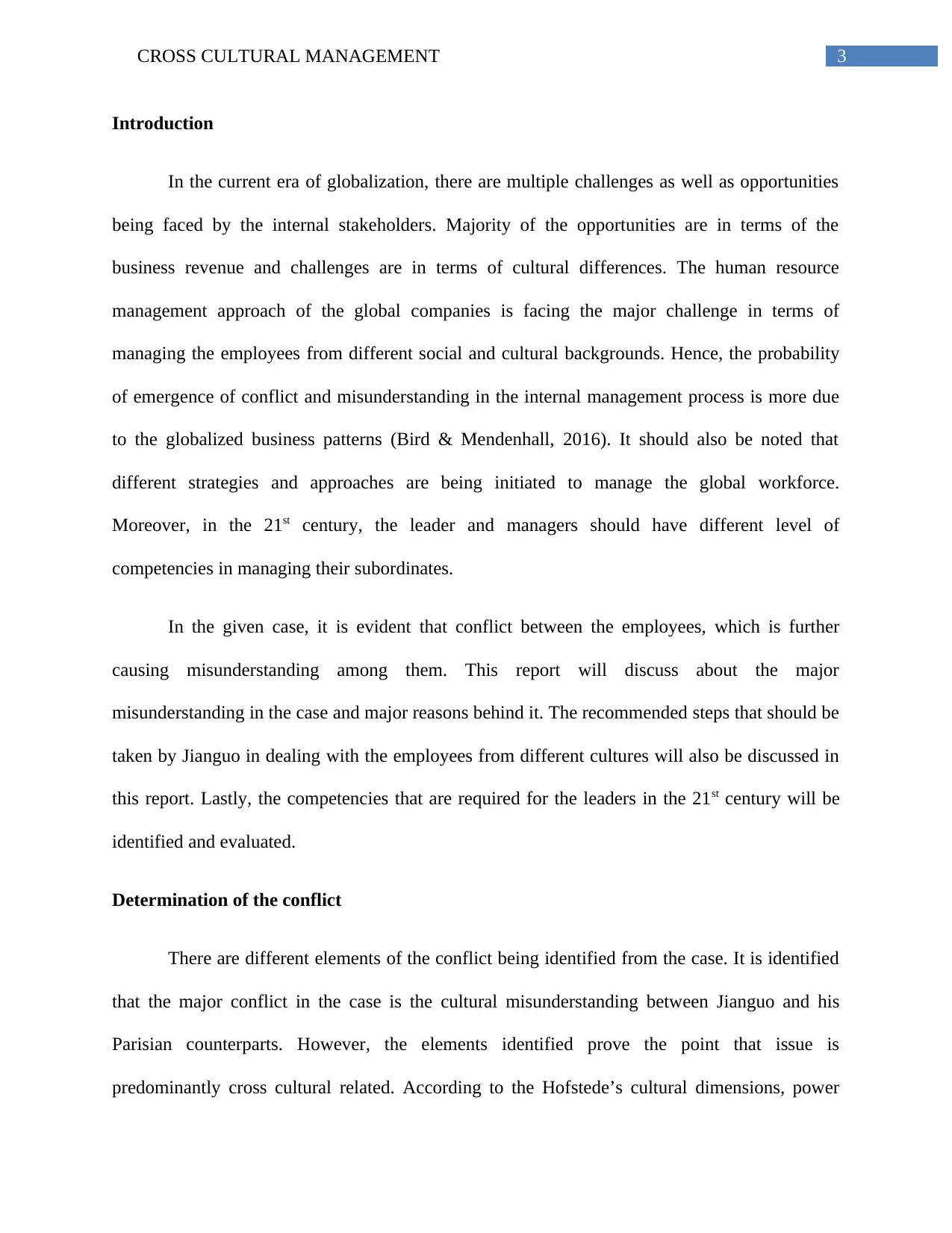
3CROSS CULTURAL MANAGEMENT
Introduction
In the current era of globalization, there are multiple challenges as well as opportunities
being faced by the internal stakeholders. Majority of the opportunities are in terms of the
business revenue and challenges are in terms of cultural differences. The human resource
management approach of the global companies is facing the major challenge in terms of
managing the employees from different social and cultural backgrounds. Hence, the probability
of emergence of conflict and misunderstanding in the internal management process is more due
to the globalized business patterns (Bird & Mendenhall, 2016). It should also be noted that
different strategies and approaches are being initiated to manage the global workforce.
Moreover, in the 21st century, the leader and managers should have different level of
competencies in managing their subordinates.
In the given case, it is evident that conflict between the employees, which is further
causing misunderstanding among them. This report will discuss about the major
misunderstanding in the case and major reasons behind it. The recommended steps that should be
taken by Jianguo in dealing with the employees from different cultures will also be discussed in
this report. Lastly, the competencies that are required for the leaders in the 21st century will be
identified and evaluated.
Determination of the conflict
There are different elements of the conflict being identified from the case. It is identified
that the major conflict in the case is the cultural misunderstanding between Jianguo and his
Parisian counterparts. However, the elements identified prove the point that issue is
predominantly cross cultural related. According to the Hofstede’s cultural dimensions, power
Introduction
In the current era of globalization, there are multiple challenges as well as opportunities
being faced by the internal stakeholders. Majority of the opportunities are in terms of the
business revenue and challenges are in terms of cultural differences. The human resource
management approach of the global companies is facing the major challenge in terms of
managing the employees from different social and cultural backgrounds. Hence, the probability
of emergence of conflict and misunderstanding in the internal management process is more due
to the globalized business patterns (Bird & Mendenhall, 2016). It should also be noted that
different strategies and approaches are being initiated to manage the global workforce.
Moreover, in the 21st century, the leader and managers should have different level of
competencies in managing their subordinates.
In the given case, it is evident that conflict between the employees, which is further
causing misunderstanding among them. This report will discuss about the major
misunderstanding in the case and major reasons behind it. The recommended steps that should be
taken by Jianguo in dealing with the employees from different cultures will also be discussed in
this report. Lastly, the competencies that are required for the leaders in the 21st century will be
identified and evaluated.
Determination of the conflict
There are different elements of the conflict being identified from the case. It is identified
that the major conflict in the case is the cultural misunderstanding between Jianguo and his
Parisian counterparts. However, the elements identified prove the point that issue is
predominantly cross cultural related. According to the Hofstede’s cultural dimensions, power
Paraphrase This Document
Need a fresh take? Get an instant paraphrase of this document with our AI Paraphraser
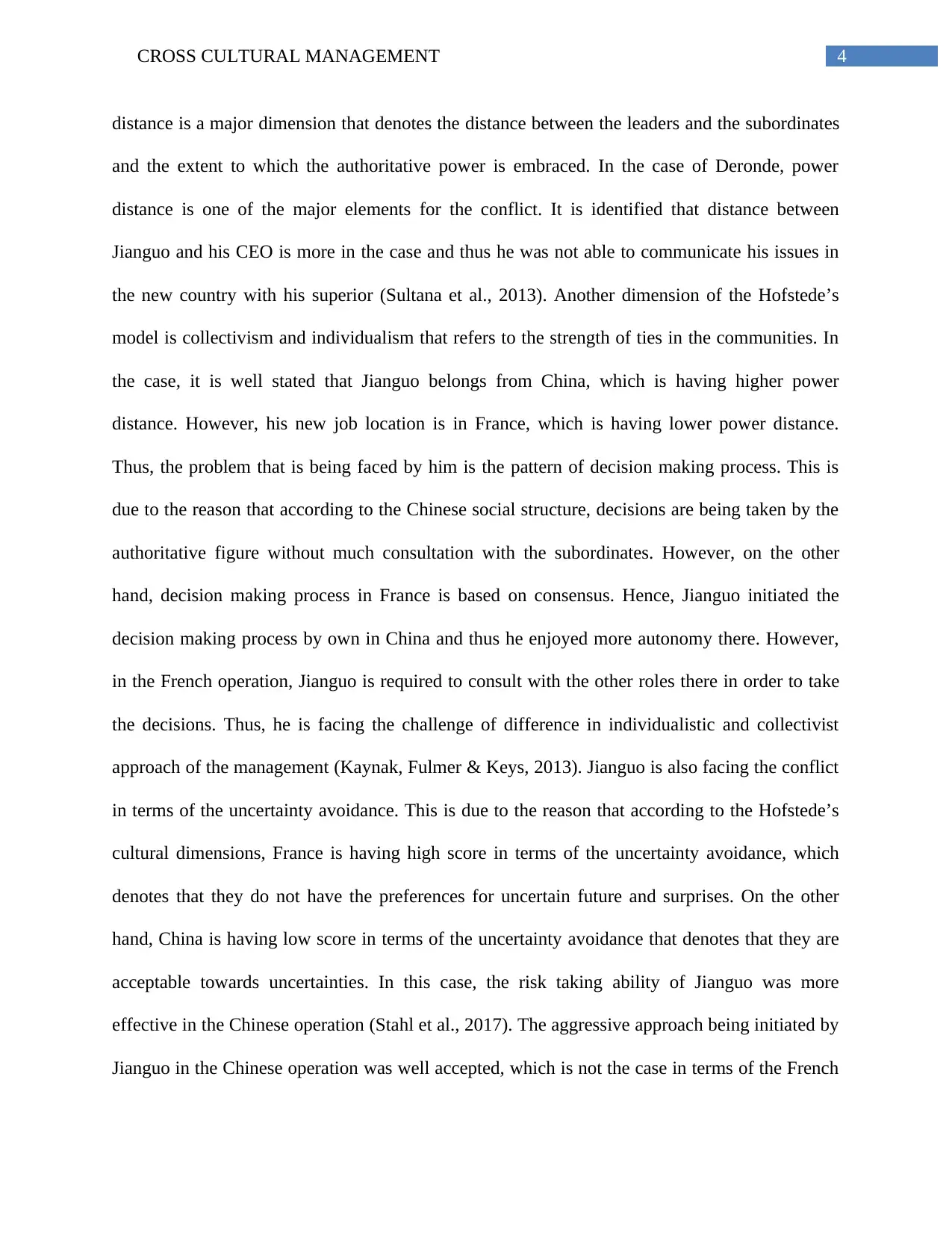
4CROSS CULTURAL MANAGEMENT
distance is a major dimension that denotes the distance between the leaders and the subordinates
and the extent to which the authoritative power is embraced. In the case of Deronde, power
distance is one of the major elements for the conflict. It is identified that distance between
Jianguo and his CEO is more in the case and thus he was not able to communicate his issues in
the new country with his superior (Sultana et al., 2013). Another dimension of the Hofstede’s
model is collectivism and individualism that refers to the strength of ties in the communities. In
the case, it is well stated that Jianguo belongs from China, which is having higher power
distance. However, his new job location is in France, which is having lower power distance.
Thus, the problem that is being faced by him is the pattern of decision making process. This is
due to the reason that according to the Chinese social structure, decisions are being taken by the
authoritative figure without much consultation with the subordinates. However, on the other
hand, decision making process in France is based on consensus. Hence, Jianguo initiated the
decision making process by own in China and thus he enjoyed more autonomy there. However,
in the French operation, Jianguo is required to consult with the other roles there in order to take
the decisions. Thus, he is facing the challenge of difference in individualistic and collectivist
approach of the management (Kaynak, Fulmer & Keys, 2013). Jianguo is also facing the conflict
in terms of the uncertainty avoidance. This is due to the reason that according to the Hofstede’s
cultural dimensions, France is having high score in terms of the uncertainty avoidance, which
denotes that they do not have the preferences for uncertain future and surprises. On the other
hand, China is having low score in terms of the uncertainty avoidance that denotes that they are
acceptable towards uncertainties. In this case, the risk taking ability of Jianguo was more
effective in the Chinese operation (Stahl et al., 2017). The aggressive approach being initiated by
Jianguo in the Chinese operation was well accepted, which is not the case in terms of the French
distance is a major dimension that denotes the distance between the leaders and the subordinates
and the extent to which the authoritative power is embraced. In the case of Deronde, power
distance is one of the major elements for the conflict. It is identified that distance between
Jianguo and his CEO is more in the case and thus he was not able to communicate his issues in
the new country with his superior (Sultana et al., 2013). Another dimension of the Hofstede’s
model is collectivism and individualism that refers to the strength of ties in the communities. In
the case, it is well stated that Jianguo belongs from China, which is having higher power
distance. However, his new job location is in France, which is having lower power distance.
Thus, the problem that is being faced by him is the pattern of decision making process. This is
due to the reason that according to the Chinese social structure, decisions are being taken by the
authoritative figure without much consultation with the subordinates. However, on the other
hand, decision making process in France is based on consensus. Hence, Jianguo initiated the
decision making process by own in China and thus he enjoyed more autonomy there. However,
in the French operation, Jianguo is required to consult with the other roles there in order to take
the decisions. Thus, he is facing the challenge of difference in individualistic and collectivist
approach of the management (Kaynak, Fulmer & Keys, 2013). Jianguo is also facing the conflict
in terms of the uncertainty avoidance. This is due to the reason that according to the Hofstede’s
cultural dimensions, France is having high score in terms of the uncertainty avoidance, which
denotes that they do not have the preferences for uncertain future and surprises. On the other
hand, China is having low score in terms of the uncertainty avoidance that denotes that they are
acceptable towards uncertainties. In this case, the risk taking ability of Jianguo was more
effective in the Chinese operation (Stahl et al., 2017). The aggressive approach being initiated by
Jianguo in the Chinese operation was well accepted, which is not the case in terms of the French
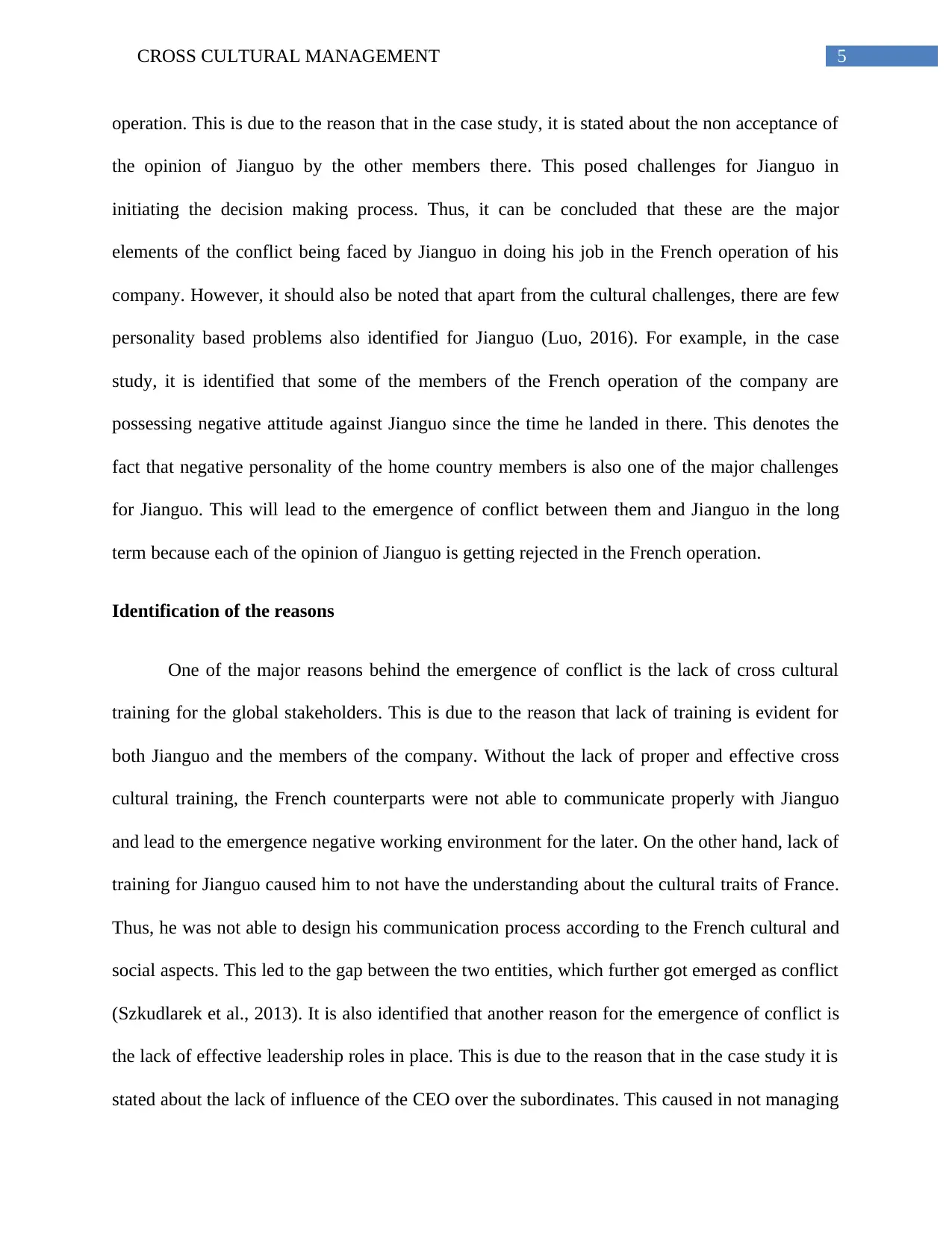
5CROSS CULTURAL MANAGEMENT
operation. This is due to the reason that in the case study, it is stated about the non acceptance of
the opinion of Jianguo by the other members there. This posed challenges for Jianguo in
initiating the decision making process. Thus, it can be concluded that these are the major
elements of the conflict being faced by Jianguo in doing his job in the French operation of his
company. However, it should also be noted that apart from the cultural challenges, there are few
personality based problems also identified for Jianguo (Luo, 2016). For example, in the case
study, it is identified that some of the members of the French operation of the company are
possessing negative attitude against Jianguo since the time he landed in there. This denotes the
fact that negative personality of the home country members is also one of the major challenges
for Jianguo. This will lead to the emergence of conflict between them and Jianguo in the long
term because each of the opinion of Jianguo is getting rejected in the French operation.
Identification of the reasons
One of the major reasons behind the emergence of conflict is the lack of cross cultural
training for the global stakeholders. This is due to the reason that lack of training is evident for
both Jianguo and the members of the company. Without the lack of proper and effective cross
cultural training, the French counterparts were not able to communicate properly with Jianguo
and lead to the emergence negative working environment for the later. On the other hand, lack of
training for Jianguo caused him to not have the understanding about the cultural traits of France.
Thus, he was not able to design his communication process according to the French cultural and
social aspects. This led to the gap between the two entities, which further got emerged as conflict
(Szkudlarek et al., 2013). It is also identified that another reason for the emergence of conflict is
the lack of effective leadership roles in place. This is due to the reason that in the case study it is
stated about the lack of influence of the CEO over the subordinates. This caused in not managing
operation. This is due to the reason that in the case study, it is stated about the non acceptance of
the opinion of Jianguo by the other members there. This posed challenges for Jianguo in
initiating the decision making process. Thus, it can be concluded that these are the major
elements of the conflict being faced by Jianguo in doing his job in the French operation of his
company. However, it should also be noted that apart from the cultural challenges, there are few
personality based problems also identified for Jianguo (Luo, 2016). For example, in the case
study, it is identified that some of the members of the French operation of the company are
possessing negative attitude against Jianguo since the time he landed in there. This denotes the
fact that negative personality of the home country members is also one of the major challenges
for Jianguo. This will lead to the emergence of conflict between them and Jianguo in the long
term because each of the opinion of Jianguo is getting rejected in the French operation.
Identification of the reasons
One of the major reasons behind the emergence of conflict is the lack of cross cultural
training for the global stakeholders. This is due to the reason that lack of training is evident for
both Jianguo and the members of the company. Without the lack of proper and effective cross
cultural training, the French counterparts were not able to communicate properly with Jianguo
and lead to the emergence negative working environment for the later. On the other hand, lack of
training for Jianguo caused him to not have the understanding about the cultural traits of France.
Thus, he was not able to design his communication process according to the French cultural and
social aspects. This led to the gap between the two entities, which further got emerged as conflict
(Szkudlarek et al., 2013). It is also identified that another reason for the emergence of conflict is
the lack of effective leadership roles in place. This is due to the reason that in the case study it is
stated about the lack of influence of the CEO over the subordinates. This caused in not managing
⊘ This is a preview!⊘
Do you want full access?
Subscribe today to unlock all pages.

Trusted by 1+ million students worldwide
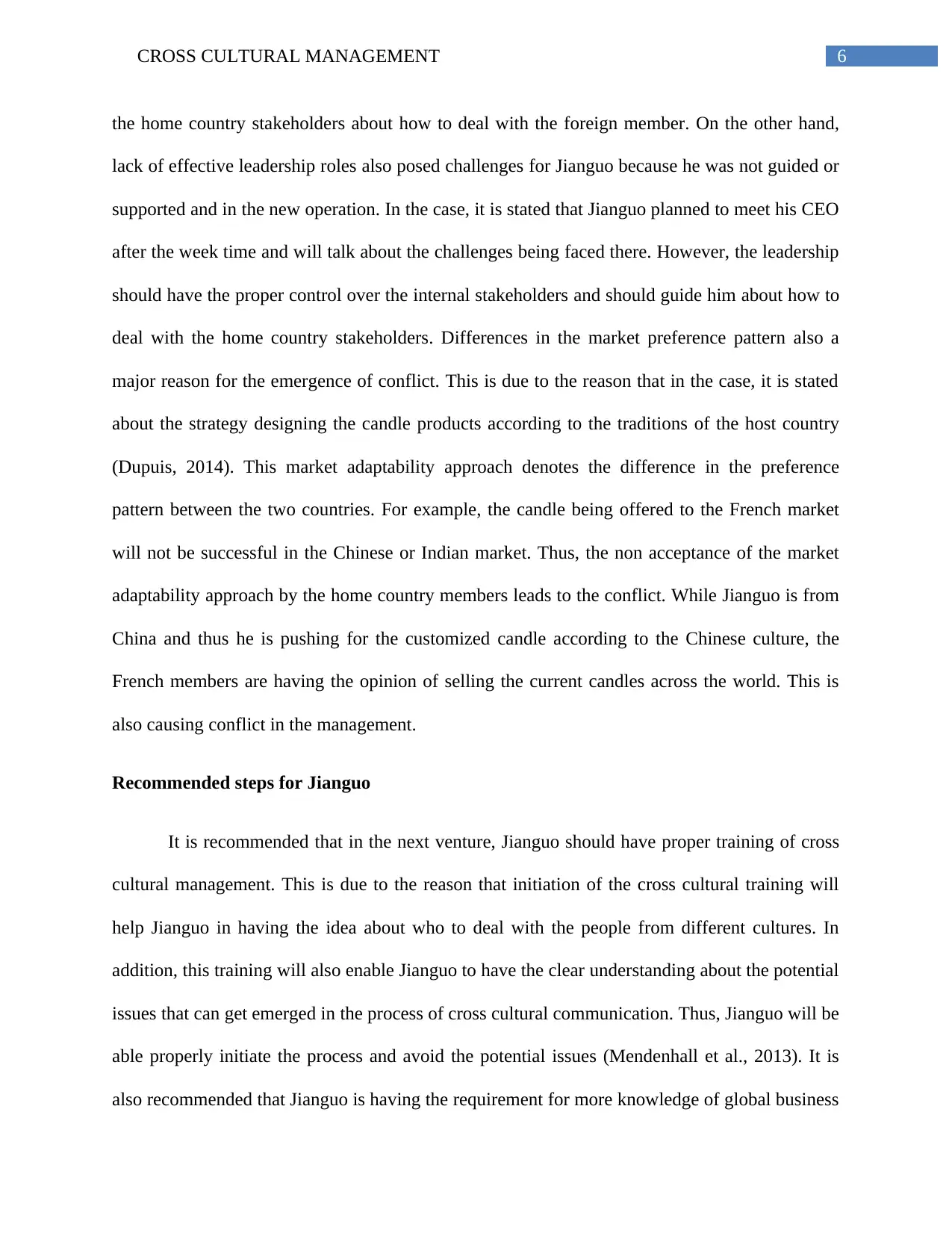
6CROSS CULTURAL MANAGEMENT
the home country stakeholders about how to deal with the foreign member. On the other hand,
lack of effective leadership roles also posed challenges for Jianguo because he was not guided or
supported and in the new operation. In the case, it is stated that Jianguo planned to meet his CEO
after the week time and will talk about the challenges being faced there. However, the leadership
should have the proper control over the internal stakeholders and should guide him about how to
deal with the home country stakeholders. Differences in the market preference pattern also a
major reason for the emergence of conflict. This is due to the reason that in the case, it is stated
about the strategy designing the candle products according to the traditions of the host country
(Dupuis, 2014). This market adaptability approach denotes the difference in the preference
pattern between the two countries. For example, the candle being offered to the French market
will not be successful in the Chinese or Indian market. Thus, the non acceptance of the market
adaptability approach by the home country members leads to the conflict. While Jianguo is from
China and thus he is pushing for the customized candle according to the Chinese culture, the
French members are having the opinion of selling the current candles across the world. This is
also causing conflict in the management.
Recommended steps for Jianguo
It is recommended that in the next venture, Jianguo should have proper training of cross
cultural management. This is due to the reason that initiation of the cross cultural training will
help Jianguo in having the idea about who to deal with the people from different cultures. In
addition, this training will also enable Jianguo to have the clear understanding about the potential
issues that can get emerged in the process of cross cultural communication. Thus, Jianguo will be
able properly initiate the process and avoid the potential issues (Mendenhall et al., 2013). It is
also recommended that Jianguo is having the requirement for more knowledge of global business
the home country stakeholders about how to deal with the foreign member. On the other hand,
lack of effective leadership roles also posed challenges for Jianguo because he was not guided or
supported and in the new operation. In the case, it is stated that Jianguo planned to meet his CEO
after the week time and will talk about the challenges being faced there. However, the leadership
should have the proper control over the internal stakeholders and should guide him about how to
deal with the home country stakeholders. Differences in the market preference pattern also a
major reason for the emergence of conflict. This is due to the reason that in the case, it is stated
about the strategy designing the candle products according to the traditions of the host country
(Dupuis, 2014). This market adaptability approach denotes the difference in the preference
pattern between the two countries. For example, the candle being offered to the French market
will not be successful in the Chinese or Indian market. Thus, the non acceptance of the market
adaptability approach by the home country members leads to the conflict. While Jianguo is from
China and thus he is pushing for the customized candle according to the Chinese culture, the
French members are having the opinion of selling the current candles across the world. This is
also causing conflict in the management.
Recommended steps for Jianguo
It is recommended that in the next venture, Jianguo should have proper training of cross
cultural management. This is due to the reason that initiation of the cross cultural training will
help Jianguo in having the idea about who to deal with the people from different cultures. In
addition, this training will also enable Jianguo to have the clear understanding about the potential
issues that can get emerged in the process of cross cultural communication. Thus, Jianguo will be
able properly initiate the process and avoid the potential issues (Mendenhall et al., 2013). It is
also recommended that Jianguo is having the requirement for more knowledge of global business
Paraphrase This Document
Need a fresh take? Get an instant paraphrase of this document with our AI Paraphraser
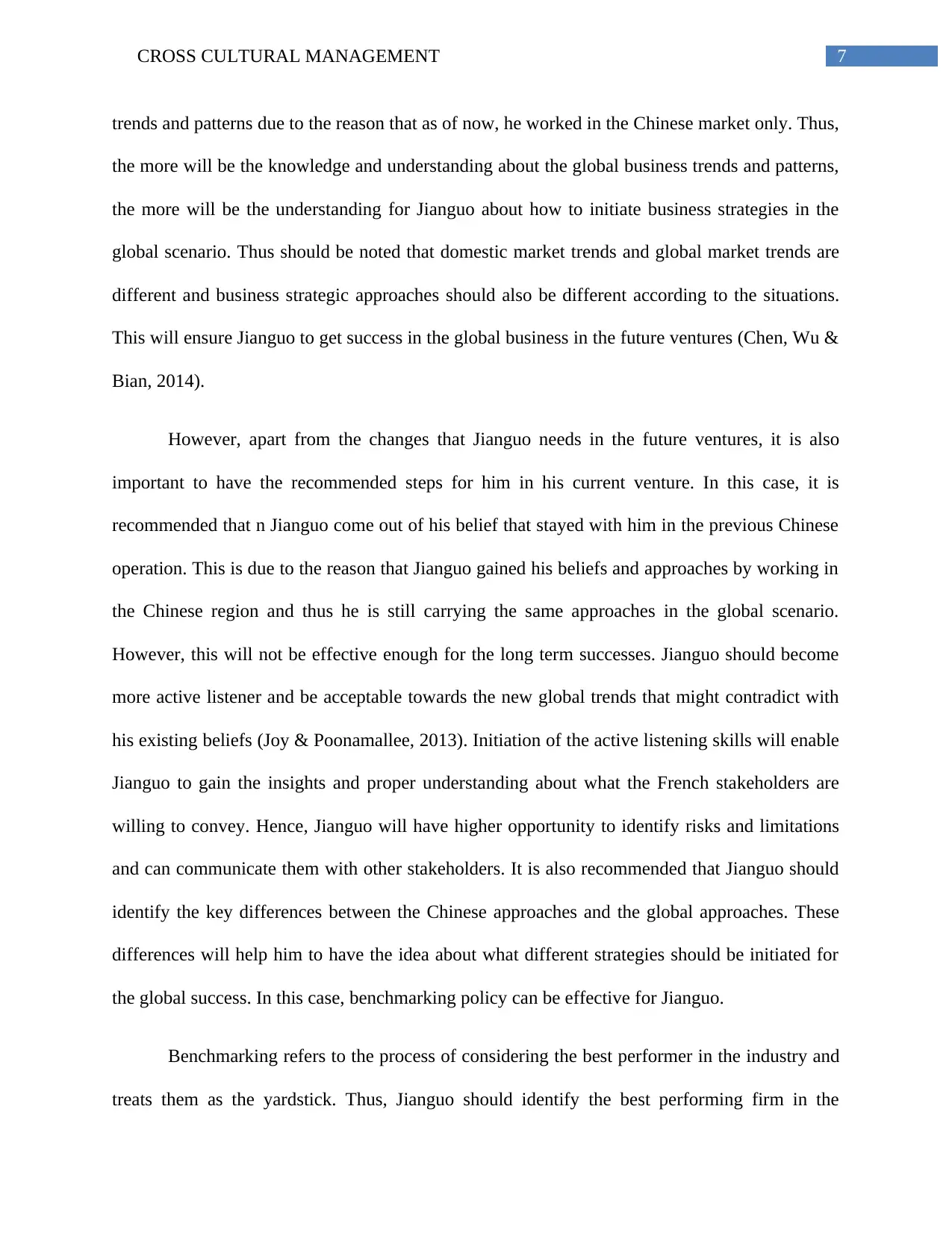
7CROSS CULTURAL MANAGEMENT
trends and patterns due to the reason that as of now, he worked in the Chinese market only. Thus,
the more will be the knowledge and understanding about the global business trends and patterns,
the more will be the understanding for Jianguo about how to initiate business strategies in the
global scenario. Thus should be noted that domestic market trends and global market trends are
different and business strategic approaches should also be different according to the situations.
This will ensure Jianguo to get success in the global business in the future ventures (Chen, Wu &
Bian, 2014).
However, apart from the changes that Jianguo needs in the future ventures, it is also
important to have the recommended steps for him in his current venture. In this case, it is
recommended that n Jianguo come out of his belief that stayed with him in the previous Chinese
operation. This is due to the reason that Jianguo gained his beliefs and approaches by working in
the Chinese region and thus he is still carrying the same approaches in the global scenario.
However, this will not be effective enough for the long term successes. Jianguo should become
more active listener and be acceptable towards the new global trends that might contradict with
his existing beliefs (Joy & Poonamallee, 2013). Initiation of the active listening skills will enable
Jianguo to gain the insights and proper understanding about what the French stakeholders are
willing to convey. Hence, Jianguo will have higher opportunity to identify risks and limitations
and can communicate them with other stakeholders. It is also recommended that Jianguo should
identify the key differences between the Chinese approaches and the global approaches. These
differences will help him to have the idea about what different strategies should be initiated for
the global success. In this case, benchmarking policy can be effective for Jianguo.
Benchmarking refers to the process of considering the best performer in the industry and
treats them as the yardstick. Thus, Jianguo should identify the best performing firm in the
trends and patterns due to the reason that as of now, he worked in the Chinese market only. Thus,
the more will be the knowledge and understanding about the global business trends and patterns,
the more will be the understanding for Jianguo about how to initiate business strategies in the
global scenario. Thus should be noted that domestic market trends and global market trends are
different and business strategic approaches should also be different according to the situations.
This will ensure Jianguo to get success in the global business in the future ventures (Chen, Wu &
Bian, 2014).
However, apart from the changes that Jianguo needs in the future ventures, it is also
important to have the recommended steps for him in his current venture. In this case, it is
recommended that n Jianguo come out of his belief that stayed with him in the previous Chinese
operation. This is due to the reason that Jianguo gained his beliefs and approaches by working in
the Chinese region and thus he is still carrying the same approaches in the global scenario.
However, this will not be effective enough for the long term successes. Jianguo should become
more active listener and be acceptable towards the new global trends that might contradict with
his existing beliefs (Joy & Poonamallee, 2013). Initiation of the active listening skills will enable
Jianguo to gain the insights and proper understanding about what the French stakeholders are
willing to convey. Hence, Jianguo will have higher opportunity to identify risks and limitations
and can communicate them with other stakeholders. It is also recommended that Jianguo should
identify the key differences between the Chinese approaches and the global approaches. These
differences will help him to have the idea about what different strategies should be initiated for
the global success. In this case, benchmarking policy can be effective for Jianguo.
Benchmarking refers to the process of considering the best performer in the industry and
treats them as the yardstick. Thus, Jianguo should identify the best performing firm in the
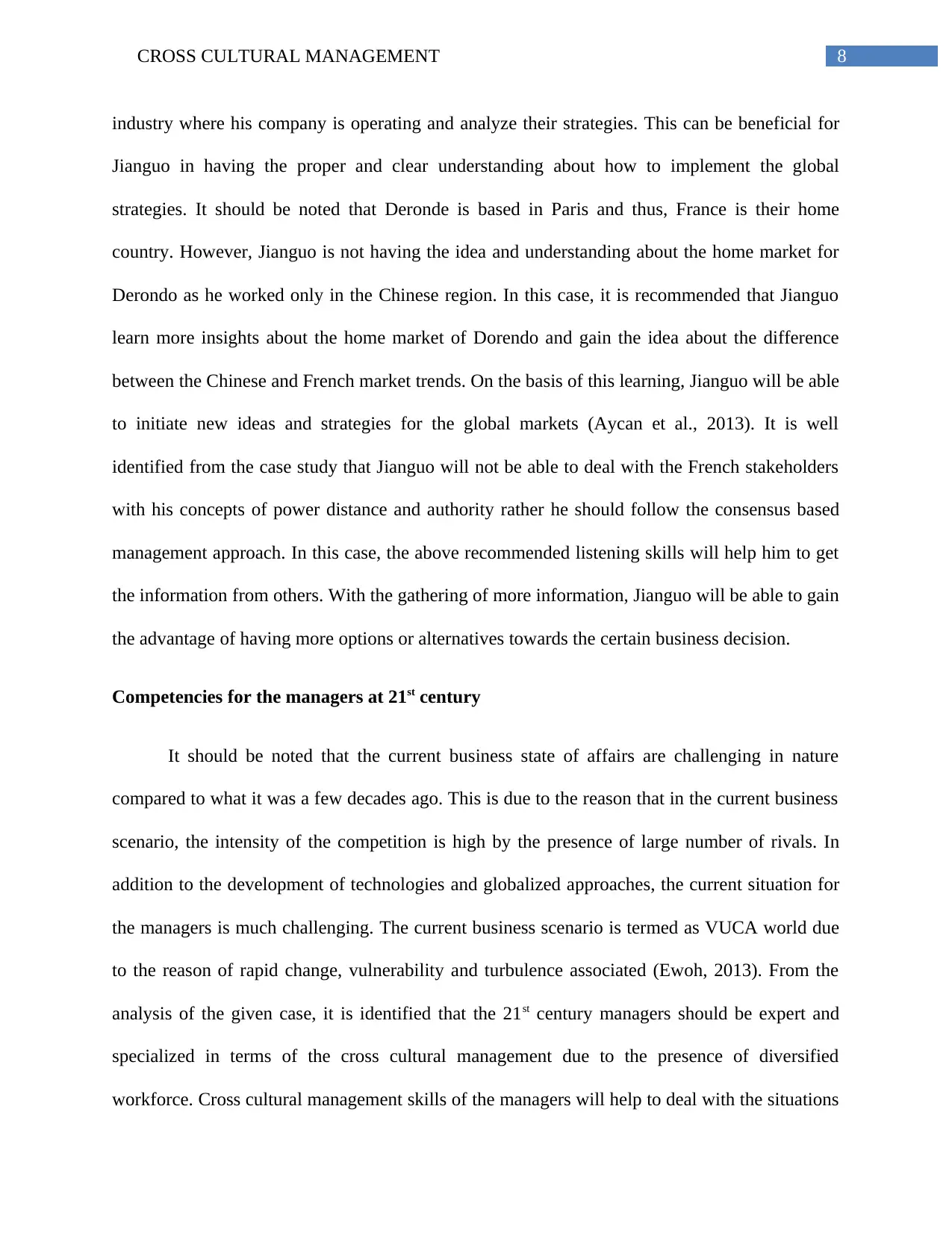
8CROSS CULTURAL MANAGEMENT
industry where his company is operating and analyze their strategies. This can be beneficial for
Jianguo in having the proper and clear understanding about how to implement the global
strategies. It should be noted that Deronde is based in Paris and thus, France is their home
country. However, Jianguo is not having the idea and understanding about the home market for
Derondo as he worked only in the Chinese region. In this case, it is recommended that Jianguo
learn more insights about the home market of Dorendo and gain the idea about the difference
between the Chinese and French market trends. On the basis of this learning, Jianguo will be able
to initiate new ideas and strategies for the global markets (Aycan et al., 2013). It is well
identified from the case study that Jianguo will not be able to deal with the French stakeholders
with his concepts of power distance and authority rather he should follow the consensus based
management approach. In this case, the above recommended listening skills will help him to get
the information from others. With the gathering of more information, Jianguo will be able to gain
the advantage of having more options or alternatives towards the certain business decision.
Competencies for the managers at 21st century
It should be noted that the current business state of affairs are challenging in nature
compared to what it was a few decades ago. This is due to the reason that in the current business
scenario, the intensity of the competition is high by the presence of large number of rivals. In
addition to the development of technologies and globalized approaches, the current situation for
the managers is much challenging. The current business scenario is termed as VUCA world due
to the reason of rapid change, vulnerability and turbulence associated (Ewoh, 2013). From the
analysis of the given case, it is identified that the 21st century managers should be expert and
specialized in terms of the cross cultural management due to the presence of diversified
workforce. Cross cultural management skills of the managers will help to deal with the situations
industry where his company is operating and analyze their strategies. This can be beneficial for
Jianguo in having the proper and clear understanding about how to implement the global
strategies. It should be noted that Deronde is based in Paris and thus, France is their home
country. However, Jianguo is not having the idea and understanding about the home market for
Derondo as he worked only in the Chinese region. In this case, it is recommended that Jianguo
learn more insights about the home market of Dorendo and gain the idea about the difference
between the Chinese and French market trends. On the basis of this learning, Jianguo will be able
to initiate new ideas and strategies for the global markets (Aycan et al., 2013). It is well
identified from the case study that Jianguo will not be able to deal with the French stakeholders
with his concepts of power distance and authority rather he should follow the consensus based
management approach. In this case, the above recommended listening skills will help him to get
the information from others. With the gathering of more information, Jianguo will be able to gain
the advantage of having more options or alternatives towards the certain business decision.
Competencies for the managers at 21st century
It should be noted that the current business state of affairs are challenging in nature
compared to what it was a few decades ago. This is due to the reason that in the current business
scenario, the intensity of the competition is high by the presence of large number of rivals. In
addition to the development of technologies and globalized approaches, the current situation for
the managers is much challenging. The current business scenario is termed as VUCA world due
to the reason of rapid change, vulnerability and turbulence associated (Ewoh, 2013). From the
analysis of the given case, it is identified that the 21st century managers should be expert and
specialized in terms of the cross cultural management due to the presence of diversified
workforce. Cross cultural management skills of the managers will help to deal with the situations
⊘ This is a preview!⊘
Do you want full access?
Subscribe today to unlock all pages.

Trusted by 1+ million students worldwide
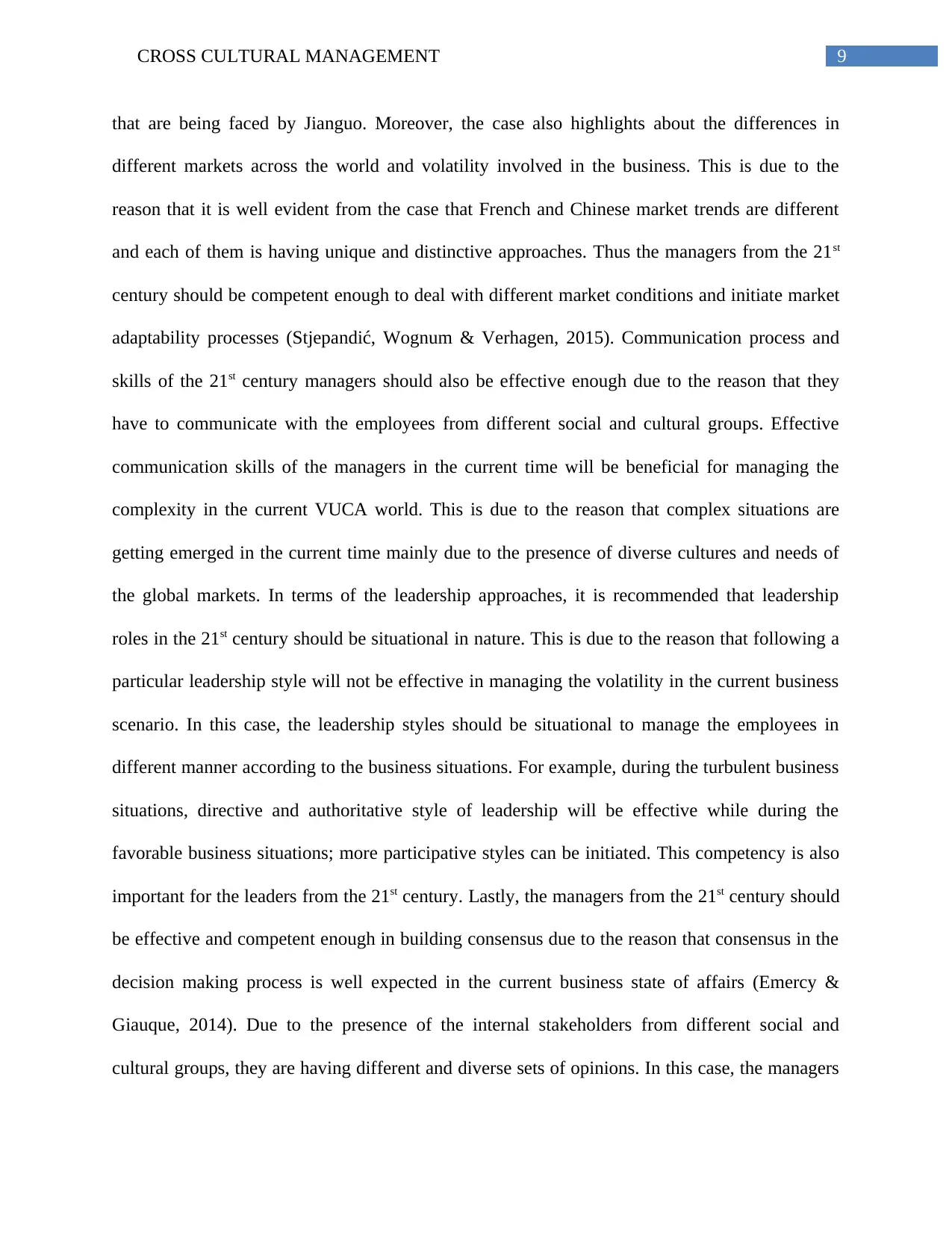
9CROSS CULTURAL MANAGEMENT
that are being faced by Jianguo. Moreover, the case also highlights about the differences in
different markets across the world and volatility involved in the business. This is due to the
reason that it is well evident from the case that French and Chinese market trends are different
and each of them is having unique and distinctive approaches. Thus the managers from the 21st
century should be competent enough to deal with different market conditions and initiate market
adaptability processes (Stjepandić, Wognum & Verhagen, 2015). Communication process and
skills of the 21st century managers should also be effective enough due to the reason that they
have to communicate with the employees from different social and cultural groups. Effective
communication skills of the managers in the current time will be beneficial for managing the
complexity in the current VUCA world. This is due to the reason that complex situations are
getting emerged in the current time mainly due to the presence of diverse cultures and needs of
the global markets. In terms of the leadership approaches, it is recommended that leadership
roles in the 21st century should be situational in nature. This is due to the reason that following a
particular leadership style will not be effective in managing the volatility in the current business
scenario. In this case, the leadership styles should be situational to manage the employees in
different manner according to the business situations. For example, during the turbulent business
situations, directive and authoritative style of leadership will be effective while during the
favorable business situations; more participative styles can be initiated. This competency is also
important for the leaders from the 21st century. Lastly, the managers from the 21st century should
be effective and competent enough in building consensus due to the reason that consensus in the
decision making process is well expected in the current business state of affairs (Emercy &
Giauque, 2014). Due to the presence of the internal stakeholders from different social and
cultural groups, they are having different and diverse sets of opinions. In this case, the managers
that are being faced by Jianguo. Moreover, the case also highlights about the differences in
different markets across the world and volatility involved in the business. This is due to the
reason that it is well evident from the case that French and Chinese market trends are different
and each of them is having unique and distinctive approaches. Thus the managers from the 21st
century should be competent enough to deal with different market conditions and initiate market
adaptability processes (Stjepandić, Wognum & Verhagen, 2015). Communication process and
skills of the 21st century managers should also be effective enough due to the reason that they
have to communicate with the employees from different social and cultural groups. Effective
communication skills of the managers in the current time will be beneficial for managing the
complexity in the current VUCA world. This is due to the reason that complex situations are
getting emerged in the current time mainly due to the presence of diverse cultures and needs of
the global markets. In terms of the leadership approaches, it is recommended that leadership
roles in the 21st century should be situational in nature. This is due to the reason that following a
particular leadership style will not be effective in managing the volatility in the current business
scenario. In this case, the leadership styles should be situational to manage the employees in
different manner according to the business situations. For example, during the turbulent business
situations, directive and authoritative style of leadership will be effective while during the
favorable business situations; more participative styles can be initiated. This competency is also
important for the leaders from the 21st century. Lastly, the managers from the 21st century should
be effective and competent enough in building consensus due to the reason that consensus in the
decision making process is well expected in the current business state of affairs (Emercy &
Giauque, 2014). Due to the presence of the internal stakeholders from different social and
cultural groups, they are having different and diverse sets of opinions. In this case, the managers
Paraphrase This Document
Need a fresh take? Get an instant paraphrase of this document with our AI Paraphraser
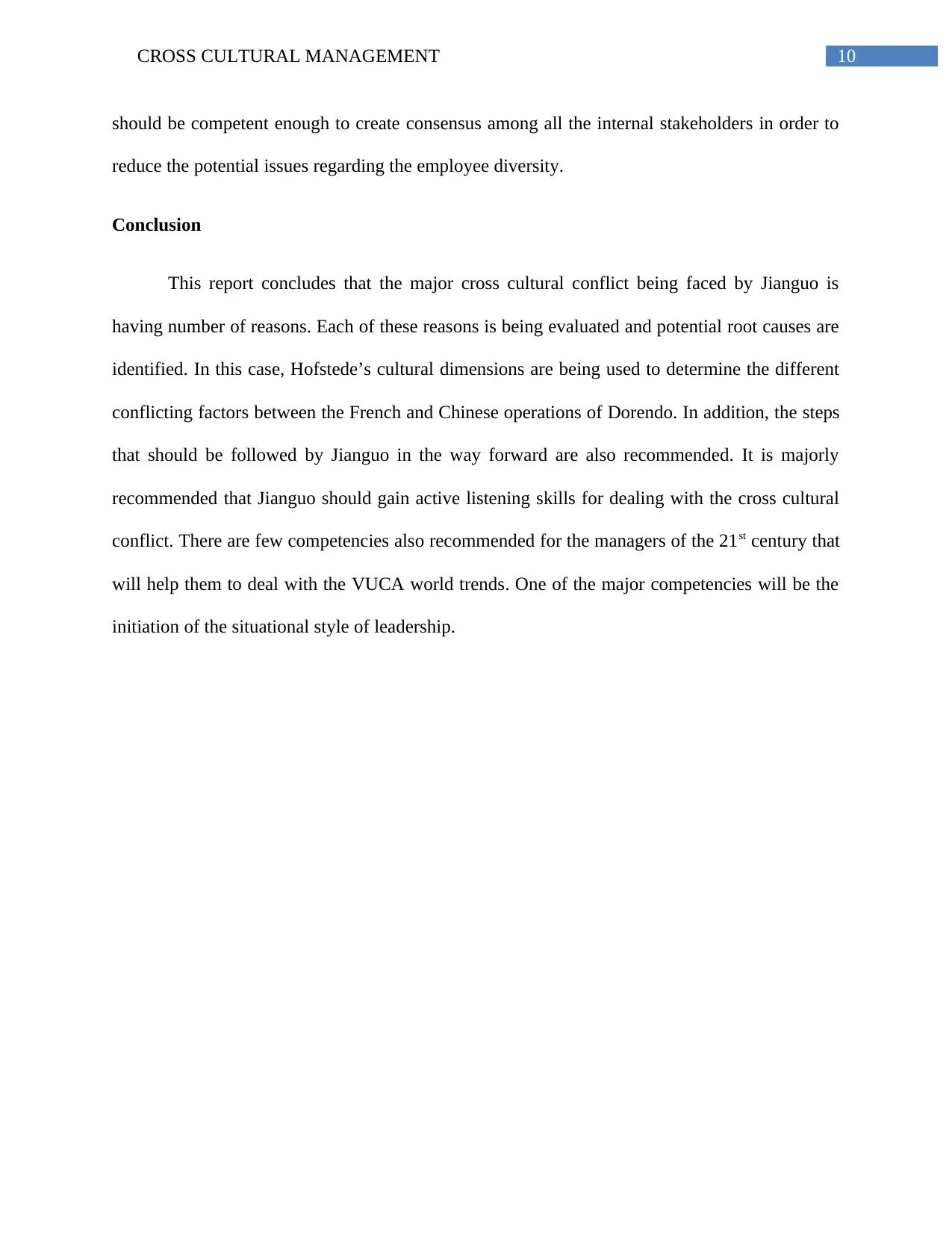
10CROSS CULTURAL MANAGEMENT
should be competent enough to create consensus among all the internal stakeholders in order to
reduce the potential issues regarding the employee diversity.
Conclusion
This report concludes that the major cross cultural conflict being faced by Jianguo is
having number of reasons. Each of these reasons is being evaluated and potential root causes are
identified. In this case, Hofstede’s cultural dimensions are being used to determine the different
conflicting factors between the French and Chinese operations of Dorendo. In addition, the steps
that should be followed by Jianguo in the way forward are also recommended. It is majorly
recommended that Jianguo should gain active listening skills for dealing with the cross cultural
conflict. There are few competencies also recommended for the managers of the 21st century that
will help them to deal with the VUCA world trends. One of the major competencies will be the
initiation of the situational style of leadership.
should be competent enough to create consensus among all the internal stakeholders in order to
reduce the potential issues regarding the employee diversity.
Conclusion
This report concludes that the major cross cultural conflict being faced by Jianguo is
having number of reasons. Each of these reasons is being evaluated and potential root causes are
identified. In this case, Hofstede’s cultural dimensions are being used to determine the different
conflicting factors between the French and Chinese operations of Dorendo. In addition, the steps
that should be followed by Jianguo in the way forward are also recommended. It is majorly
recommended that Jianguo should gain active listening skills for dealing with the cross cultural
conflict. There are few competencies also recommended for the managers of the 21st century that
will help them to deal with the VUCA world trends. One of the major competencies will be the
initiation of the situational style of leadership.
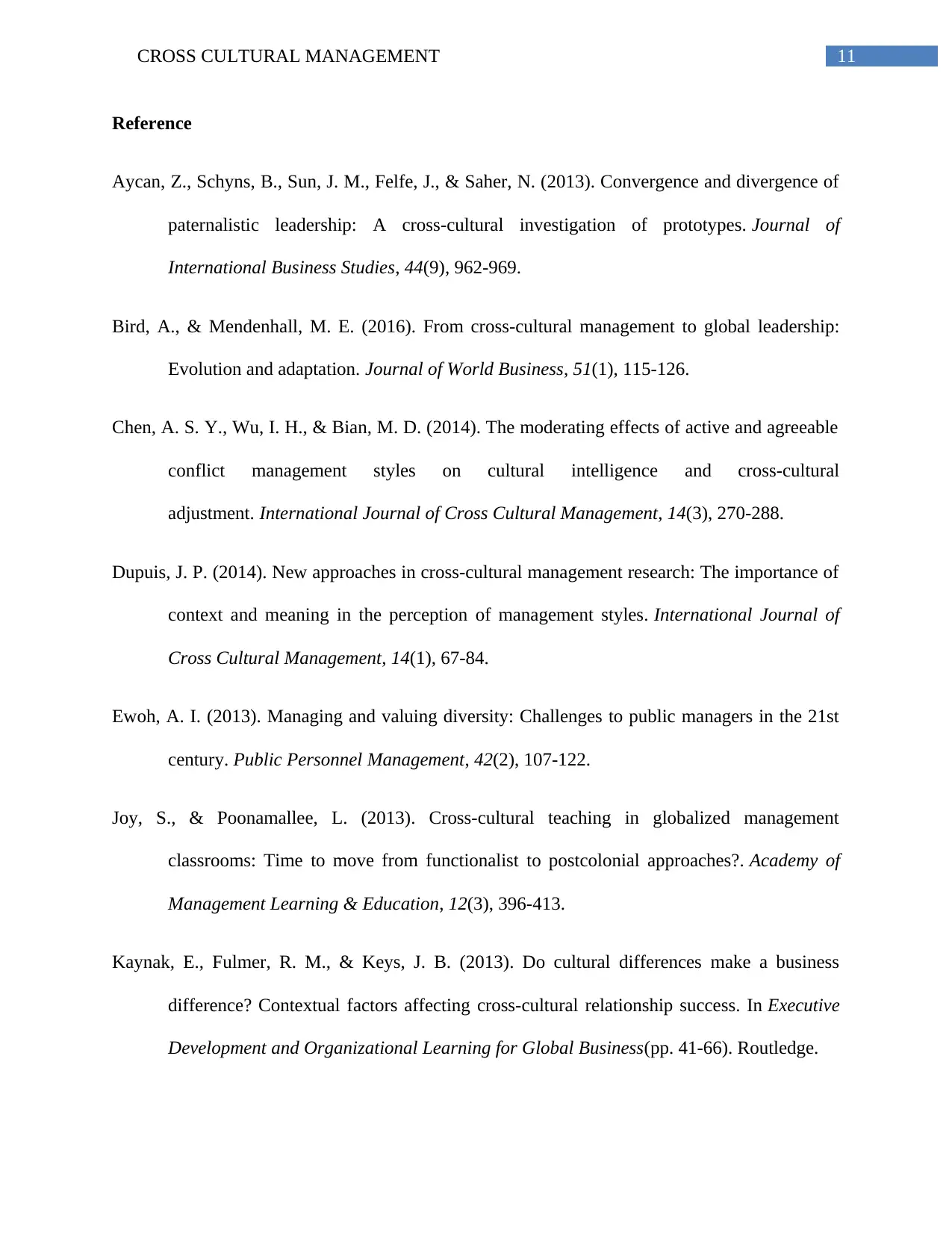
11CROSS CULTURAL MANAGEMENT
Reference
Aycan, Z., Schyns, B., Sun, J. M., Felfe, J., & Saher, N. (2013). Convergence and divergence of
paternalistic leadership: A cross-cultural investigation of prototypes. Journal of
International Business Studies, 44(9), 962-969.
Bird, A., & Mendenhall, M. E. (2016). From cross-cultural management to global leadership:
Evolution and adaptation. Journal of World Business, 51(1), 115-126.
Chen, A. S. Y., Wu, I. H., & Bian, M. D. (2014). The moderating effects of active and agreeable
conflict management styles on cultural intelligence and cross-cultural
adjustment. International Journal of Cross Cultural Management, 14(3), 270-288.
Dupuis, J. P. (2014). New approaches in cross-cultural management research: The importance of
context and meaning in the perception of management styles. International Journal of
Cross Cultural Management, 14(1), 67-84.
Ewoh, A. I. (2013). Managing and valuing diversity: Challenges to public managers in the 21st
century. Public Personnel Management, 42(2), 107-122.
Joy, S., & Poonamallee, L. (2013). Cross-cultural teaching in globalized management
classrooms: Time to move from functionalist to postcolonial approaches?. Academy of
Management Learning & Education, 12(3), 396-413.
Kaynak, E., Fulmer, R. M., & Keys, J. B. (2013). Do cultural differences make a business
difference? Contextual factors affecting cross-cultural relationship success. In Executive
Development and Organizational Learning for Global Business(pp. 41-66). Routledge.
Reference
Aycan, Z., Schyns, B., Sun, J. M., Felfe, J., & Saher, N. (2013). Convergence and divergence of
paternalistic leadership: A cross-cultural investigation of prototypes. Journal of
International Business Studies, 44(9), 962-969.
Bird, A., & Mendenhall, M. E. (2016). From cross-cultural management to global leadership:
Evolution and adaptation. Journal of World Business, 51(1), 115-126.
Chen, A. S. Y., Wu, I. H., & Bian, M. D. (2014). The moderating effects of active and agreeable
conflict management styles on cultural intelligence and cross-cultural
adjustment. International Journal of Cross Cultural Management, 14(3), 270-288.
Dupuis, J. P. (2014). New approaches in cross-cultural management research: The importance of
context and meaning in the perception of management styles. International Journal of
Cross Cultural Management, 14(1), 67-84.
Ewoh, A. I. (2013). Managing and valuing diversity: Challenges to public managers in the 21st
century. Public Personnel Management, 42(2), 107-122.
Joy, S., & Poonamallee, L. (2013). Cross-cultural teaching in globalized management
classrooms: Time to move from functionalist to postcolonial approaches?. Academy of
Management Learning & Education, 12(3), 396-413.
Kaynak, E., Fulmer, R. M., & Keys, J. B. (2013). Do cultural differences make a business
difference? Contextual factors affecting cross-cultural relationship success. In Executive
Development and Organizational Learning for Global Business(pp. 41-66). Routledge.
⊘ This is a preview!⊘
Do you want full access?
Subscribe today to unlock all pages.

Trusted by 1+ million students worldwide
1 out of 13
Related Documents
Your All-in-One AI-Powered Toolkit for Academic Success.
+13062052269
info@desklib.com
Available 24*7 on WhatsApp / Email
![[object Object]](/_next/static/media/star-bottom.7253800d.svg)
Unlock your academic potential
Copyright © 2020–2026 A2Z Services. All Rights Reserved. Developed and managed by ZUCOL.





